29 April 2025
By Maynard Paton
H1 2024 results summary for Andrews Sykes (ASY):
- A standstill performance, as “milder winter temperatures and a slow start to the summer cooling season” trimmed revenue by 1%, left profit unchanged and kept the dividend at 11.9p per share for the eleventh consecutive H1.
- Both the UK (revenue down 2%) and Europe (revenue down 4%) succumbed to the moderate weather, while fresh management continued the Middle East’s welcome turnaround (revenue up 38%).
- Controlled cost of sales, lower depreciation plus disposal gains led to a healthy 25% operating margin — the highest for an H1 since 2008 — to underline the group’s premium 24/7/365 “emergency” service.
- The very respectable accounts now showcase net cash at £21m, but the figure may have to reach £30m before the 91% Murray family shareholders declare another special dividend.
- A possible 12x P/E and 5.3% yield do not appear expensive as beneficial/extreme weather conditions are awaited, although the limited free float and distinctive corporate governance have rarely led to a premium rating. I continue to hold.
Contents
- News link, share data and disclosure
- Why I own ASY
- Results summary
- Revenue, profit and dividend
- UK
- Europe
- Middle East
- Financials
- Boardroom
- Valuation
News link, share data and disclosure
- Share price: 490p
- Share count: 41,858,744
- Market capitalisation: £205m
- Disclosure: Maynard owns shares in Andrews Sykes. This blog post contains ShareScope affiliate links.
Why I own ASY

- Supplies air conditioners, portable heaters and industrial pumps for hire, with success based on a prompt 24/7/365 service, high-quality rental fleet and trade-only customer base.
- Straightforward accounts regularly showcase high margins, generous cash flow, net cash and satisfactory returns on equity.
- Chairman and family are 91%/£187m shareholders and their “presence and requirements… has resulted in a strategy with the key aim of creating long–term shareholder value“. (point 14b).
Further reading: My ASY Buy report | All my ASY posts | ASY website
Results summary
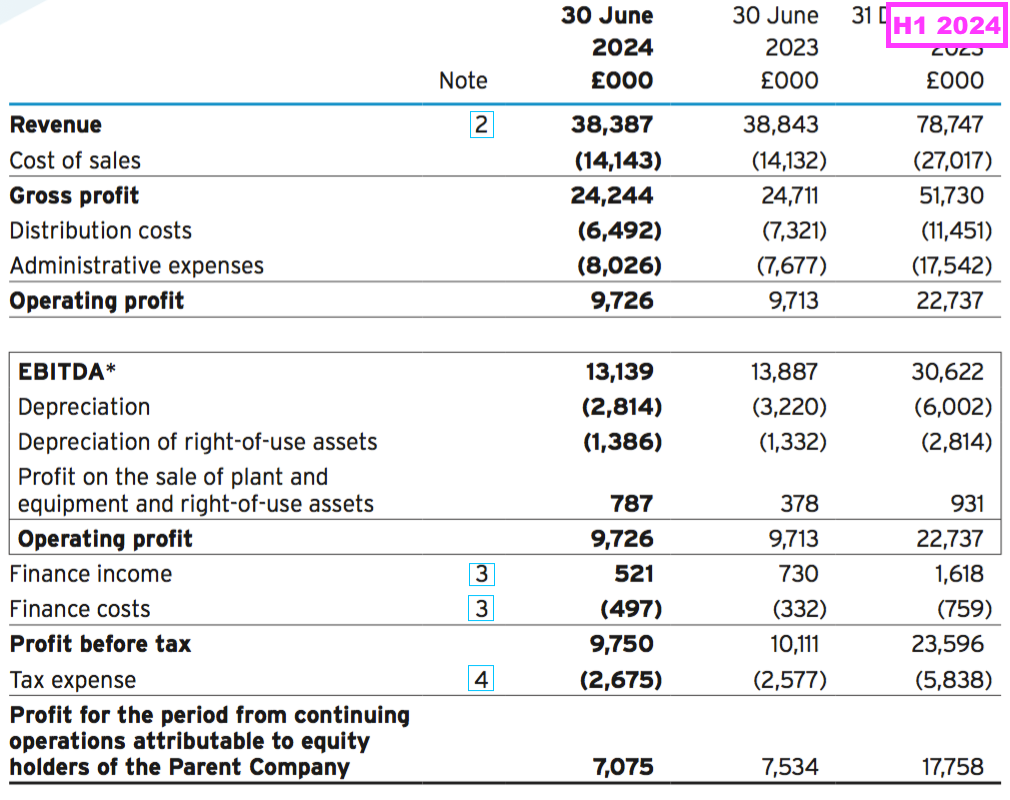
Revenue, profit and dividend
“Trading momentum has continued into the current year, with overall performance in the year to date in line with the Board’s expectations. The group is confident in its core markets, its revenues and its profits.”
- …alongside busy company-blog activity…
- “Sykes assist in re-opening of the Channel Tunnel“;
- “The call for warmth from a supermarket in need of a space heater hire“;
- “Empty theatre gets a makeover with the help of our industrial dehumidifier hire and heating“;
- “Andrews Sykes flood packages put to action!“;
- “Sykes Pumps to the rescue: a pipe dream come true“;
- “Drying out damp: Andrews Sykes keeps housing project on track“;
- “Sykes Pumps delivers seamless drainage solutions on site“;
- “Sykes Pumps to the rescue for a loyal customer“, and;
- “We provide temporary marquee heating for outdoor events and parties“.
- …had already provided hope this H1 would reveal satisfactory progress.
- In the event, this H1 just about matched the record performance of the comparable H1.
- H1 revenue slipped 1% to £38.4m…
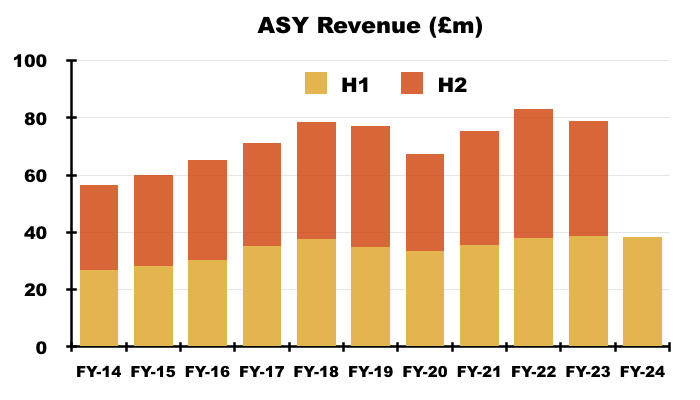
- …while H1 operating profit remained at £9.7m:
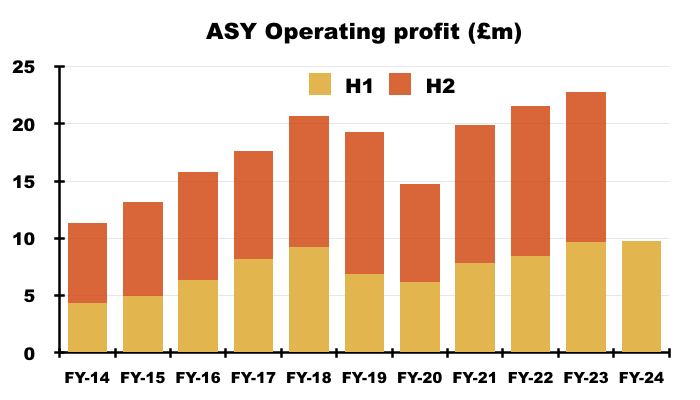
- A 3% reduction to this H1’s core Hire revenue was counterbalanced by a remarkable 26% rebound enjoyed by the group’s Other sources of income:
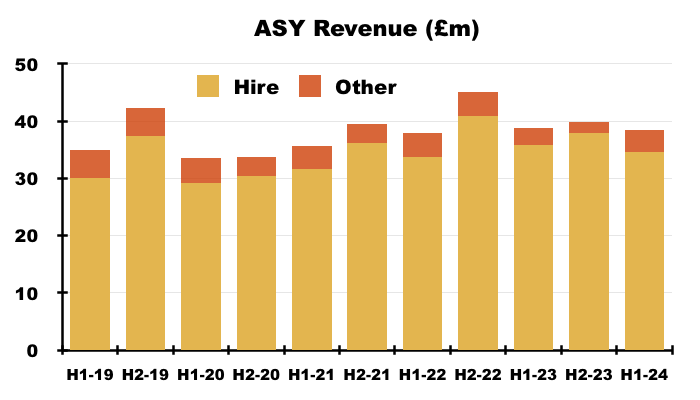
- Other sources of income involve revenue from sales, maintenance and installation of equipment, with H1 revenue from equipment sales at £2.9m registering the best six months since H1 2020 (£3.2m):
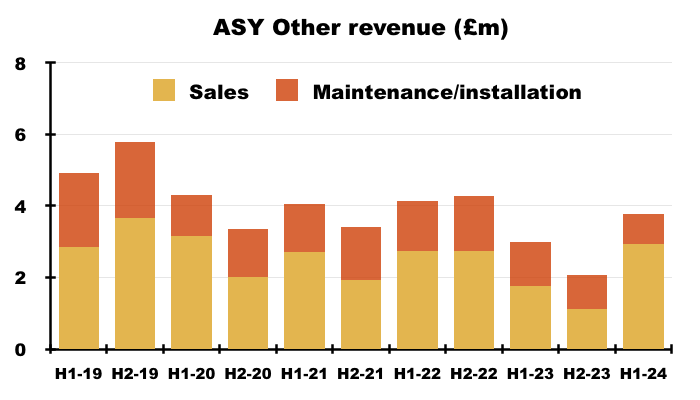
- The H1 revenue comparison was complicated slightly by the closure of the group’s French operation, which generated £1m during the comparable H1 but nothing during this H1 (see Europe).
- This H1’s maintained profit was supported by a reduced depreciation charge and a greater contribution from the disposal of old hire equipment and leasehold assets (see Financials):
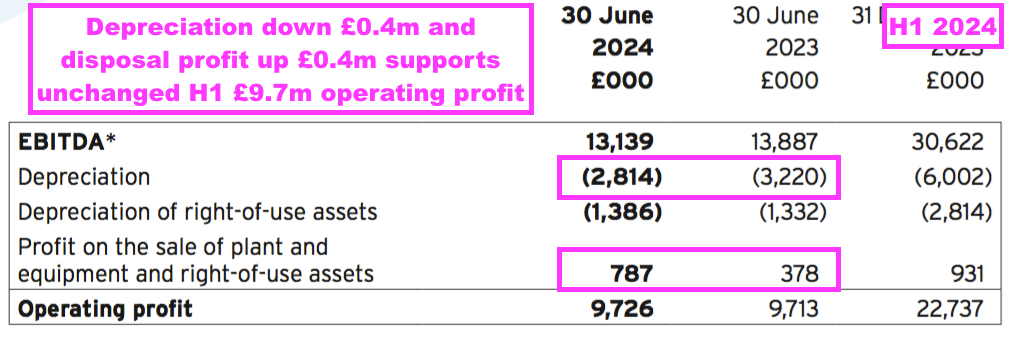
- Extreme weather — particularly cold snaps, heatwaves and extensive rain — typically prompt sudden demand for the group’s hire equipment (primarily temporary boilers, air conditioners and water pumps).
- Progress from year to year can therefore fluctuate due to different climatic conditions.
- FY 2022 had indicated water pumps were ASY’s largest earners, although this H1 hinted lower demand for temporary boilers and air conditioners had led to the standstill performance.
- Indeed, “milder winter temperatures and a slow start to the summer cooling season” during this H1 curtailed progress throughout both the UK and Europe.
- This H1’s stable profit meant the H1 dividend was set at 11.9p per share for the eleventh consecutive H1:
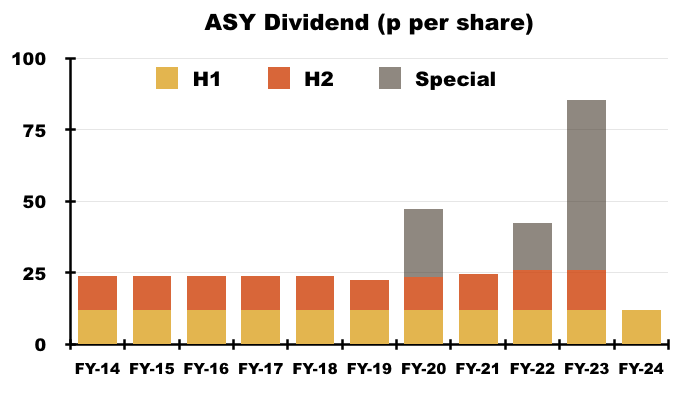
UK
- ASY can trace its UK Sykes history back to the 1850s and its UK Andrews history back to the 1960s:
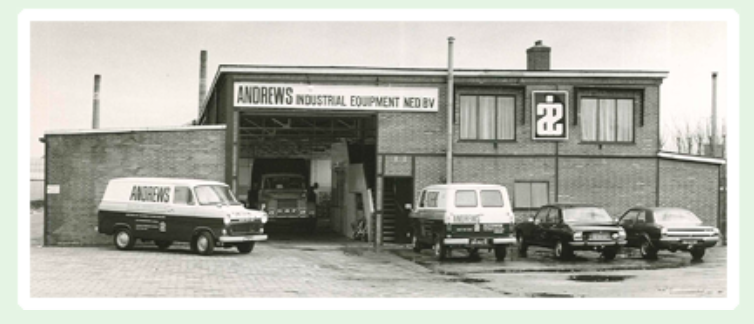
- The combined group today offers a trade-only nationwide rental service supplying pumping equipment, air conditioners, air purifiers, chillers, heaters, boilers, dehumidifiers and ventilation units:

- ASY’s competitive edge is based upon depots providing first-class 24/7/365 customer service (point 1)…
[FY 2023] “By providing a premium level of service 24 hours per day, 365 days per year, we have become the preferred supplier to many major businesses and operations spanning a huge range of industries and geographic locations. Our reputation for providing high levels of training to our staff whilst maintaining a strict health and safety workplace, within an environmentally conscious culture, makes us an employer of choice for our industry.”
- …and stocking the best and most relevant equipment for different clients (point 1):
[FY 2023] “Continual investment in new technology ensures that we provide our customers with new solutions to overcome their operational challenges. We constantly review and refresh our fleet of rental equipment to ensure that we set the standards within the rental industry throughout the UK, Europe and the Middle East.”
- ASY’s UK Hire and Sales division is the group’s dominant operation.
- For the preceding FY, UK Hire and Sales represented 57% of group revenue and 62% of group profit, which led to a super divisional margin of 34%:
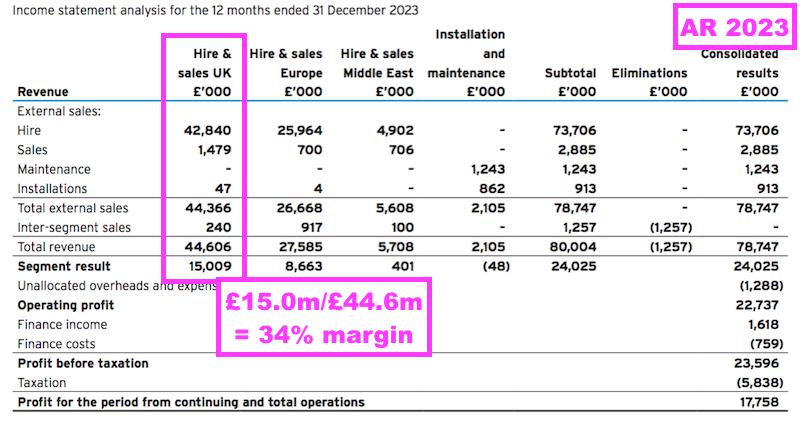
- ASY sadly does not disclose a similar segmental analysis within its H1 statements.
- This H1’s (limited) commentary indicated revenue from Andrews Sykes Hire Limited — ASY’s main UK subsidiary — declined 1.6%:
“Revenue at Andrews Sykes Hire in the UK declined by 1.6% compared with the same period in 2023 with a combination of milder winter temperatures and a slow start to the summer cooling season limiting revenue opportunities.”
- A 1.6% UK revenue reduction is not ideal, especially as revenue at Andrews Sykes Hire Limited has increased from £39m to only £44m during the ten years prior to this H1 — equivalent to a 1.4% CAGR:
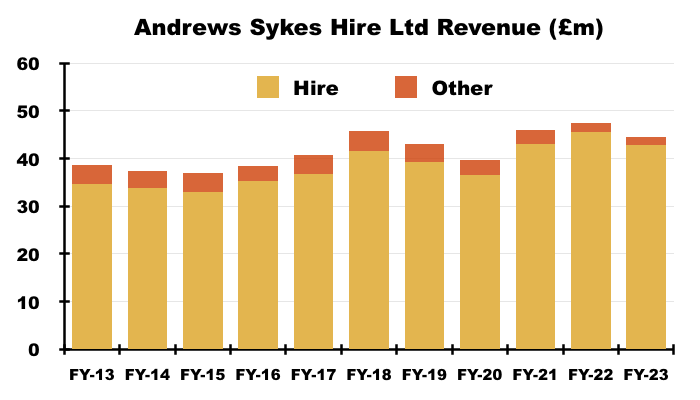
- H1 revenue from equipment maintenance and installation — which is derived almost entirely from ASY’s smaller UK subsidiary — declined 31%:
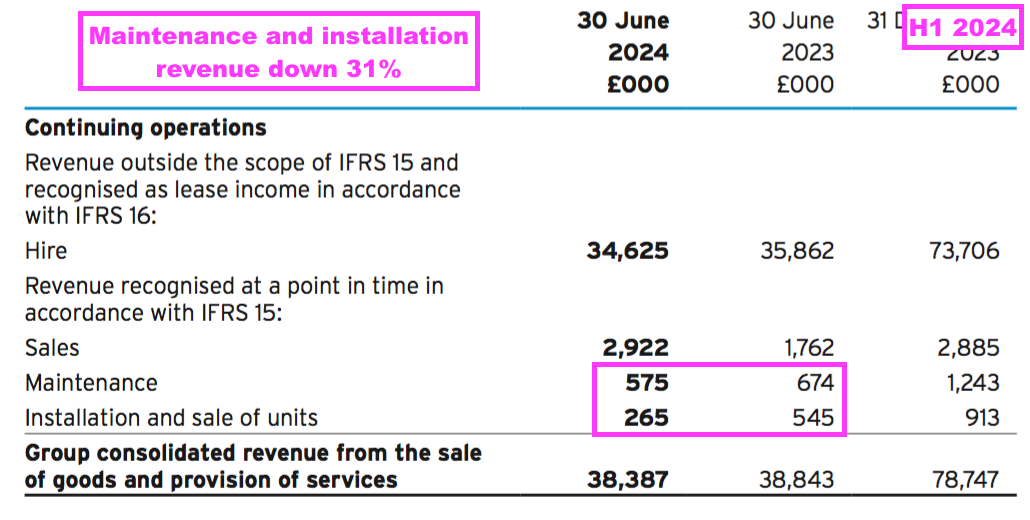
- Total H1 UK revenue therefore slipped 3.7% to represent 60.5% of group turnover:
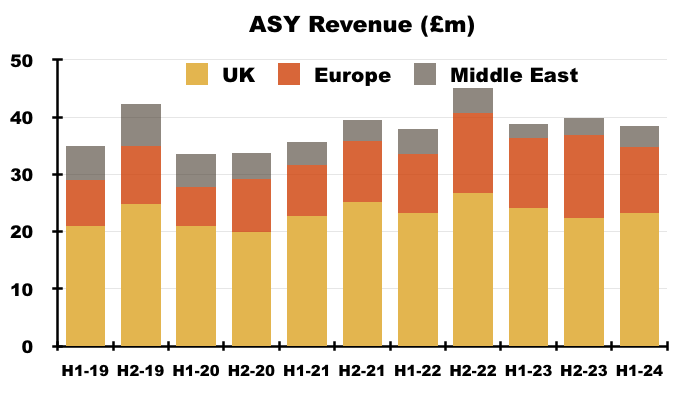
- 60.5% is the lowest UK H1 revenue contribution since H1 2019 (59.7%).
- The preceding FY confirmed seven UK depots had been, or were being, relocated into two larger sites:
[FY 2023] “Restructuring provision relates to the continuing property relocation within the UK. In the previous year four properties were vacated and merged into one large consolidated site… During the current year, three further property locations are in the process of being vacated and merged into one larger facility.”
- The site relocations have yet to result in any obvious UK revenue improvements.
- Mind you, the relocations did help Andrews Sykes Hire Limited reduce its gas consumption by an astounding 45% during the preceding FY (point 13):
[FY 2023] “Moving to newer, more efficient depot locations is also enabling the more efficient heating and lighting of our operations and reducing the level of gas and electricity usage.”
- ASY’s website says the UK operation trades from 34 locations versus 32 cited within my preceding FY review.
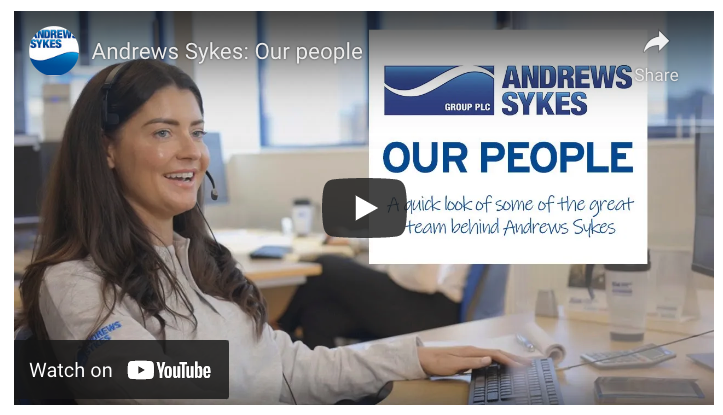
- The depot relocations could be assisting Andrews Sykes Hire Limited’s employee productivity.
- Revenue per employee within ASY’s main UK subsidiary has surpassed £148k during the last three FYs after never previously reaching £140k:
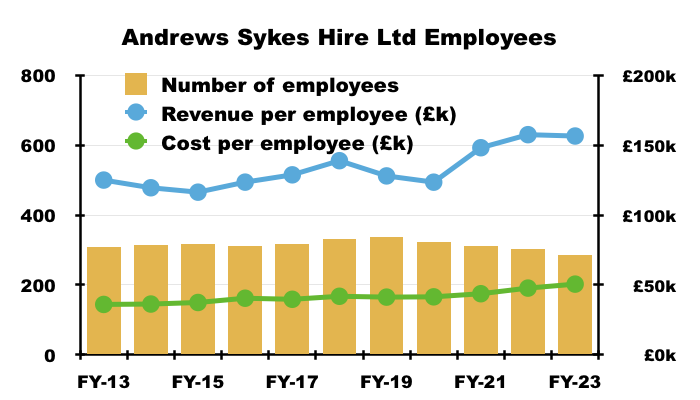
- But Andrews Sykes Hire Limited has found hire-equipment utilisation more difficult to enhance.
- Annual hire revenue from ASY’s main UK subsidiary has generally matched the original cost of the hire equipment:
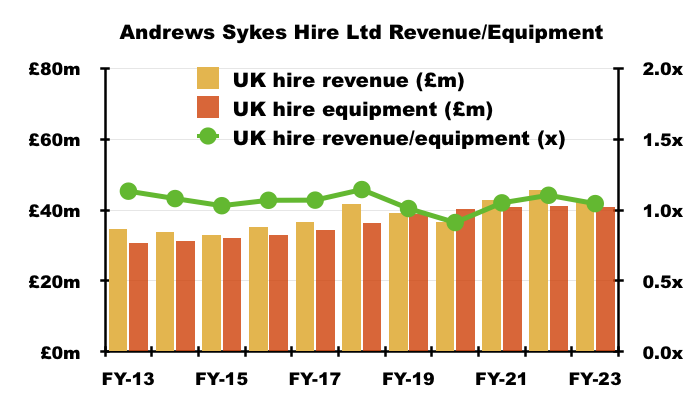
Europe
- Europe remains ASY’s main opportunity for growth.
- Between FYs 2013 and 2023, European revenue expanded from £10.4m to £26.7m to represent 34% of group turnover:
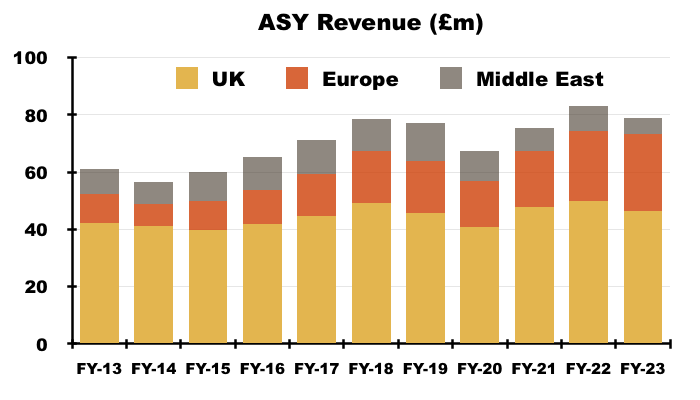
- But this H1 witnessed European revenue slide 4.4% to £11.6m to support 30% of group turnover:

- Similar to the UK, Europe also suffered “milder winter temperatures and a slow start to the summer cooling season” during this H1:
“Our businesses in Europe also faced similar conditions, with revenue decreasing 12.2% compared to the same period in 2023 (4.5% decrease excluding the impact of closing our loss-making French subsidiary).”
- I cannot reconcile ASY’s above reference to a 12.2% reduction to European revenue against this H1’s geographical analysis:

- ASY highlighted poor H1 progress within Luxembourg and Belgium:
“This [performance] was largely driven by disappointing performances from our Luxembourg and Belgian subsidiaries, with revenues down 37.6% and 24.8% respectively on the same period in 2023.
Luxembourg has been impacted by issues within the construction industry, a major revenue market for our products, with the Luxembourg Government declaring crisis measures in February 2024. Like the UK, Belgium was impacted by milder winter temperatures and a slow start to the summer cooling season.”
- Luxembourg revenue is now back to its H1 2022 level after the subsidiary enjoyed an “exceptional” comparable H1:
[H1 2023] “This [European] result was driven by an exceptional performance from our Luxembourg and Dutch subsidiaries, with revenues up 64.8% and 24.1% respectively on the same period in 2022“
- H1 Belgian revenue down almost 25% feels ominous, although this subsidiary had recorded turnover up 26%, 42% and 7% during the preceding three FYs.
- After the French subsidiary was closed during the preceding FY, a Belgian depot now serves ASY customers located within northern France:
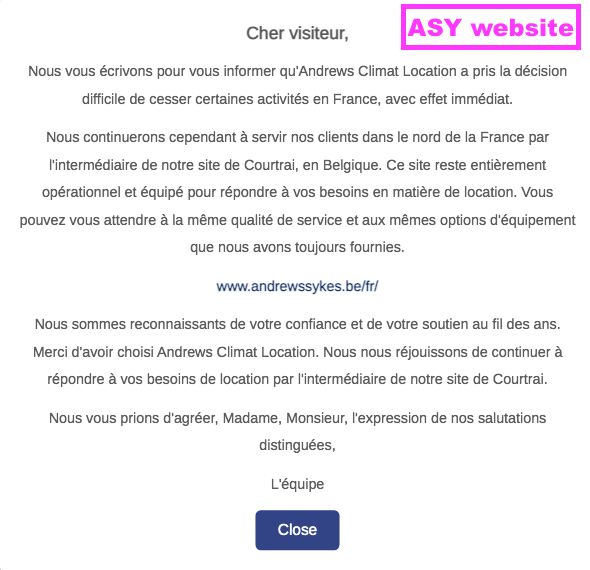
- This H1’s star European performer was Italy:
“Italy continued to perform strongly with revenue increasing 10.6% compared to 2023“
- The preceding three FYs witnessed Italian revenue gain 20%, 73% and 25%.
- As well as differing weather conditions, ASY’s European subsidiaries are each dependent on only a handful of depots:
- Netherlands:
- Established FY 1971
- 4 depots (Amsterdam, Bleiswijk, Hoogeveen, Oirschot)
- Belgium:
- Established FY 2007
- 3 depots (Antwerp, Brussels, Kortrijk)
- Italy:
- Established FY 2011
- 4 depots (Bologna, Milan, Toscana, Verona)
- Switzerland:
- Established FY 2013
- 2 depots (Geneva, Zurich)
- Luxembourg:
- Established FY 2014
- 1 depot (Luxembourg)
- Germany:
- Established FY 2023
- 1 depot (Frechen)
- Netherlands:
- Significant progress or difficulties at an individual depot can therefore have a notable impact on the performance of the associated European subsidiary.
- The combined European operations enjoyed a lovely 31% margin during the preceding FY:
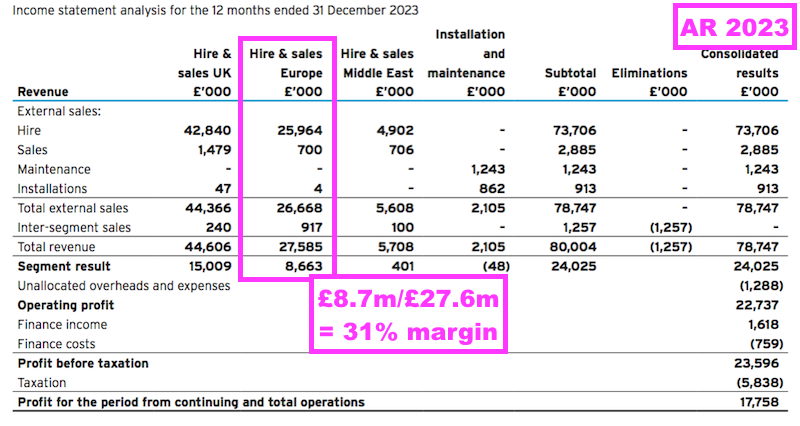
- That 31% margin may improve further now the loss-making French operation has been closed. ASY does not disclose its divisional margins within its H1 statements, but the European FY margin has been rising every year since it was first disclosed during FY 2020:
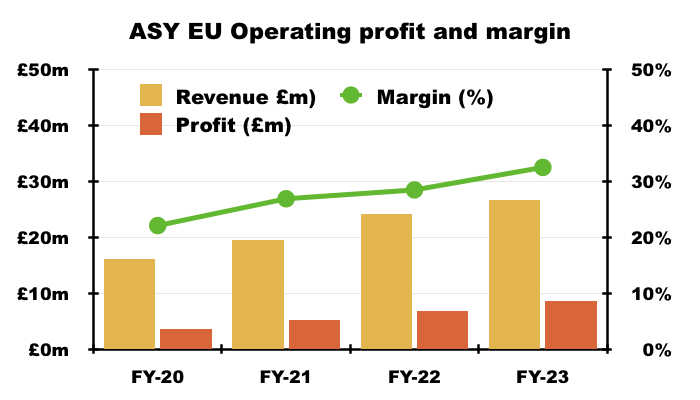
- The French exit means European depots have increased from six to only 15 since FY 2011.
- Opening a net nine depots since FY 2011 could mean future European growth will be slow going.
- Perhaps the European country with the greatest near-term potential is Germany, in which ASY opened its first depot during the preceding FY and was at the time described by the group as an “exciting market“.

Middle East
- ASY’s Middle Eastern ventures appear to be recovering following a difficult few years.
- To recap, between FY 2019 and the preceding FY, divisional revenue of more than £13m collapsed to less than £6m while profit of more than £3m plunged to just £0.4m:
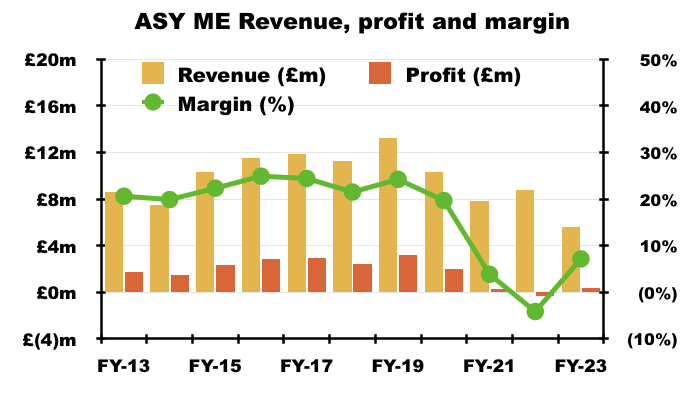
- Amid the division’s lack of new projects alongside customers not settling their bills, the preceding FY reported new management was undertaking a turnaround:
[FY 2023] “New local management has been installed during the current year and a turnaround of this business is underway. It is pleasing that core hire revenues in the second half of the year are 38.1% up on the first half of the year and in line with that generated in the previous year. Management is confident of a return to increasing profitability in the Middle East.”
- This H1 reported the turnaround had continued:
“Khansaheb Sykes, our business based in the UAE, continues to experience an improvement in trading performance since the introduction of new senior management in the previous year.
Revenue increased 31.7% versus the first half of 2023 with a decision taken to lease a new depot in Abu Dhabi further expected to increase revenue opportunities. The increased turnover in the UAE has resulted in operating profit being £0.4m higher to the first half of 2023.”
- Total H1 Middle Eastern revenue gained 38% to £3.6m:

- At its FY 2019 peak, the Middle Eastern division supported 17% of group revenue and enjoyed a 20% profit margin, which perhaps explains why ASY is persisting with what was once a lucrative region.
- Possibly promising Middle Eastern omens are the region’s blog sparking into life following an 18-month hiatus plus the creation of Andrews Sykes Hire Saudi Limited at Companies House.

Financials
- ASY’s accounts remain very respectable.
- This H1’s operating margin was a super 25.3% and was the highest for an H1 since H1 2008 (26.0%):
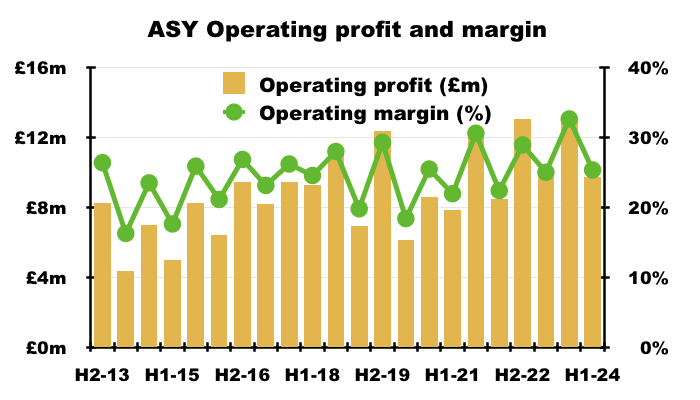
- ASY’s FY operating margin has generally exceeded 25% during recent years, and the healthy profitability probably stems from customers paying a premium for the group’s “emergency” or “business critical” service (points 1 and 9):
[FY 2023] “The Andrews Sykes Group is one of the market leaders in the rental of specialist hire equipment, offering bespoke solutions to our customers for their temporary or emergency needs.”
…
“We aim to provide dependable high-quality services to our business partners in the UK, Northern Europe and Middle East. We often provide business critical solutions to key businesses and are instrumental in helping our customers achieve their goals.”
- Good control of cost of sales — which has ensured the group’s gross margin now extends beyond 60% — has also supported the healthy operating margin:
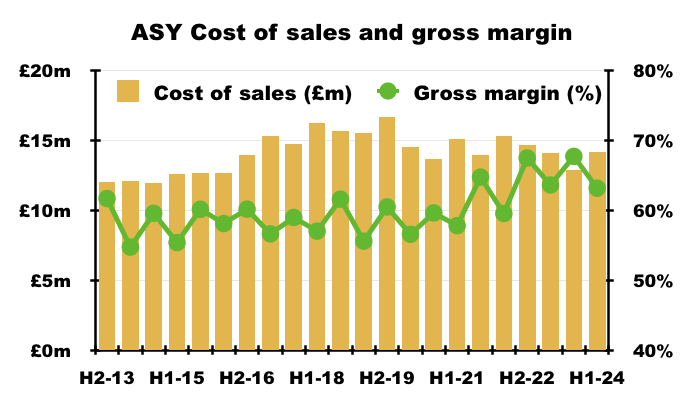
- Commendable workforce management appears to have assisted ASY’s profitability.
- The group’s total FY employee cost has been kept at a steady 30% or so of FY revenue…
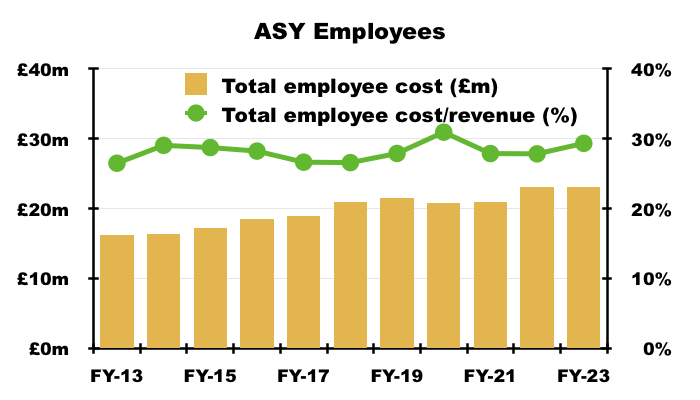
- …as higher salaries were offset by a 19% reduction to employee numbers since FY 2019:
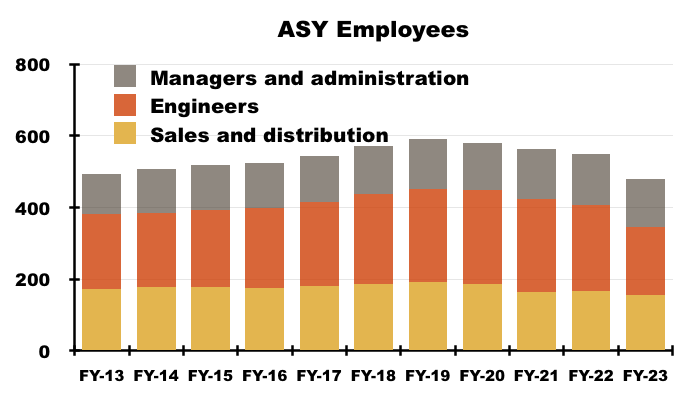
- This H1’s operating margin was supported by a lower deprecation charge and a greater profit relating to the disposal of fixed assets:

- This H1’s depreciation charge did not appear unduly low at the equivalent of 15% of the average property, plant and equipment employed during the six months:

- Depreciation has been charged at a typical 15% of property, plant and equipment during H1 and H2 for at least the last ten FYs:
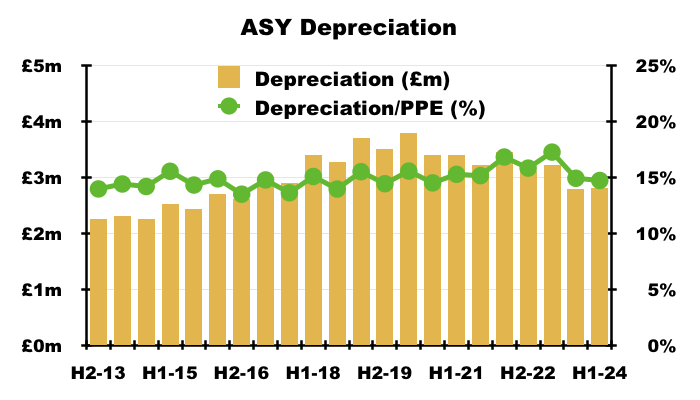
- While the greater profit relating to the sale of fixed assets did enhance this H1’s operating margin by two percentage points, ASY has regularly captured such disposal gains:
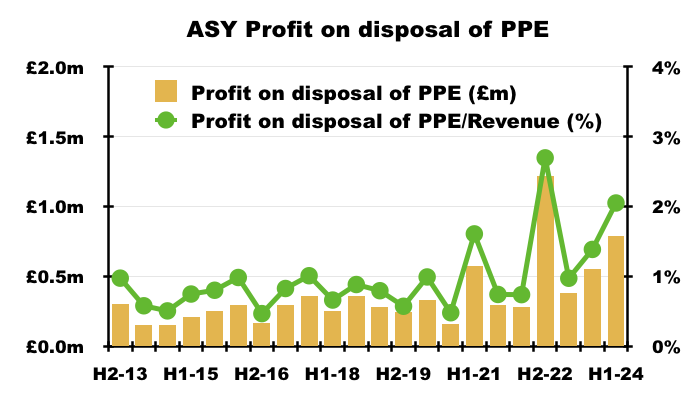
- The regular disposal gains imply ASY consistently ‘over-depreciates’ its property, plant and equipment, which in turn has arguably suppressed past margins by a percentage point or two.
- This H1’s cash flow strangely showed the £787k profit from the fixed-asset disposals generating cash proceeds of only £673k:
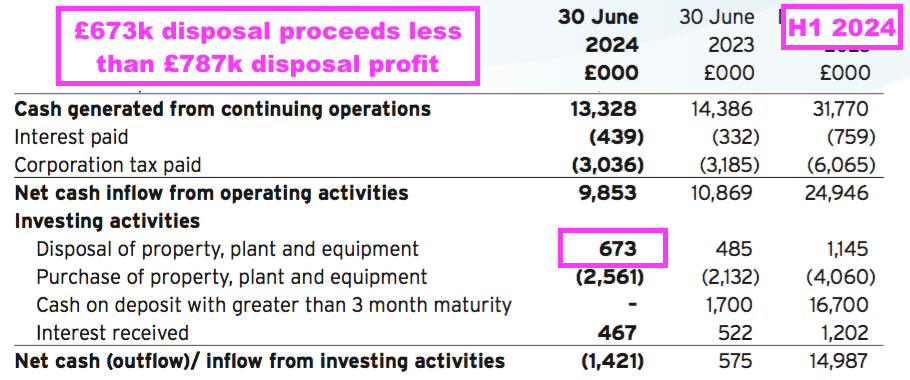
- The preceding FY reiterated the disposal gains should not be extrapolated throughout ASY’s entire hire fleet (point 19b):
[FY 2023] “The profits on the disposal of hire assets represent occasional requests to sell hire assets, often to an existing customer, and are not considered by management to indicate that there is positive residual value in the entire hire assets portfolio.”
- The preceding FY also reiterated ASY’s hire fleet contains equipment with book values of zero that continue to generate revenue (points 16a and 19b):
[FY 2023] “To provide sufficient asset availability for periods of extreme weather, the group routinely keeps nil net book value items rather than scrap them.”
- This H1’s cash capital expenditure was £0.2m less than the associated depreciation charge:
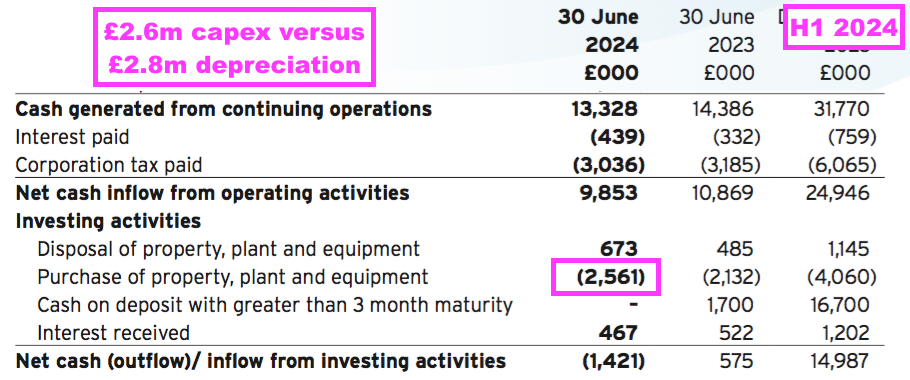
- Depreciation charged against earnings has regularly covered cash capital expenditure:
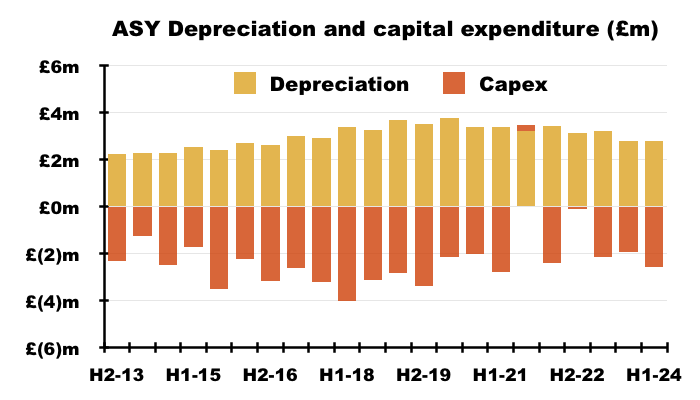
- For example, during the five years prior to this H1, aggregate cash capital expenditure of £19m compared to aggregate depreciation of £34m.
- Mind you, ASY’s capital expenditure is complicated by the group acquiring equipment as stock for resale but then capitalising a proportion of that stock into the hire fleet.
- The preceding FY reported stock of £2.4m was transferred into the fleet…
[FY 2023] “In addition a further £2,522,000 of items held in stock at 31 December 2022 (2022: £2,651,000 items held in stock at 31 December 2021) have been capitalised in the hire fleet this year“.
- …and, in total, the five years prior to this H1 witnessed a £12m transfer.
- This £12m is arguably capital expenditure rather than stock investment, but the £12m plus the aforementioned £19m five-year capex is still less than the aforementioned £34m five-year depreciation.
- This H1’s ‘over-depreciation’ and disposal proceeds ensured satisfactory cash conversion.
- Reported H1 earnings of £7.08m essentially matched H1 free cash flow of £7.04m. Notable items influencing this H1’s cash conversion included:
- A £125k pension-scheme charge;
- A positive £1.1m working-capital cash movement, and;
- An adverse £1.1m provision movement.
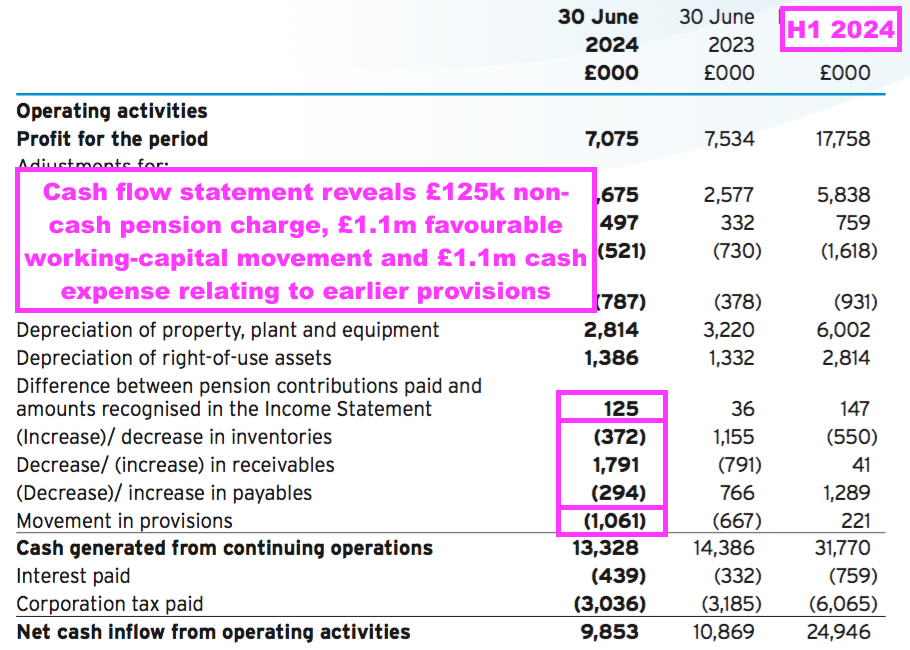
- The £125k pension-scheme charge is interesting.
- The comparable H1 announced the pension scheme’s obligations had been “fully de-risked” through a buy-in with Canada Life, while the preceding FY confirmed no cash contributions would be paid to the scheme during FY 2024:
[FY 2023] “This transaction, whilst significantly reducing the defined benefit pension scheme surplus recorded on the balance sheet, means that future liabilities are fully de-risked and the company will not be required to contribute significant cash payments into the pension scheme to fund adverse liability movements…
No cash contributions are to be made during 2024.”
- FY 2024 will reveal all the details, but for now this H1 suggests ASY continues to accrue a pension-scheme expense against earnings that has no associated cash payment.
- ASY’s working-capital management continues to impress.
- For example, during the five years prior to this H1, aggregate cash of £144m was generated through operations but only £3m was subsequently absorbed into working capital:
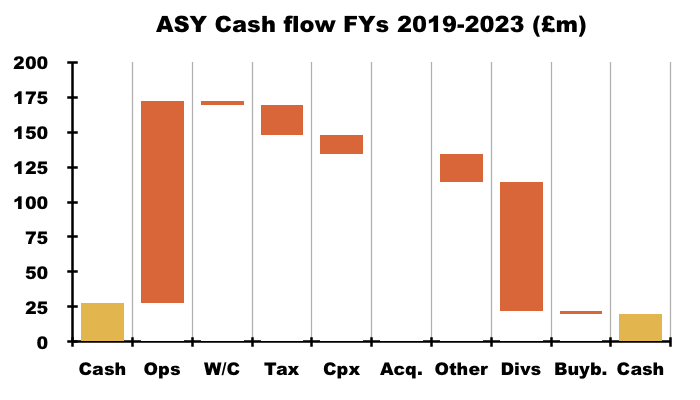
- The favourable working-capital profile has been derived through greater payables, whereby ASY has gradually extended the time it pays its expenses (point 30):
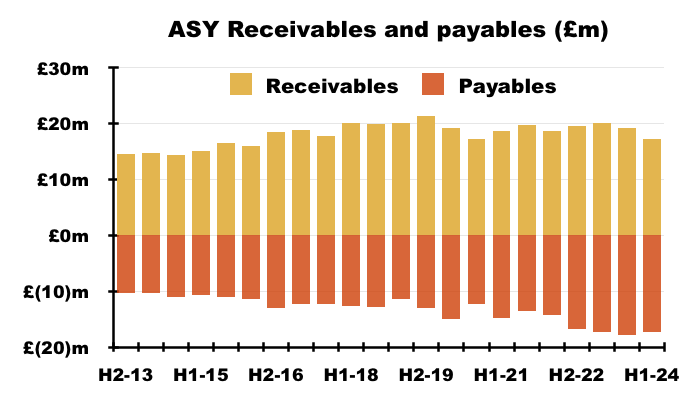
- Not helping this H1’s cash conversion was a £1.1m adverse provision movement. This £1.1m had previously been charged to earnings, and reflects cash expenditure relating to the aforementioned UK relocations and the closure of the French depots.
- This H1 confirmed earlier provisions of £1.8m had yet to incur actual cash payments.
- Free cash flow of £7.1m funded the preceding FY’s final dividend of £5.9m and left the cash balance £1.2m higher at £21.1m.
- Bank debt remaining at zero meant net cash was equivalent to 28% of trailing twelve-month revenue of £78m:
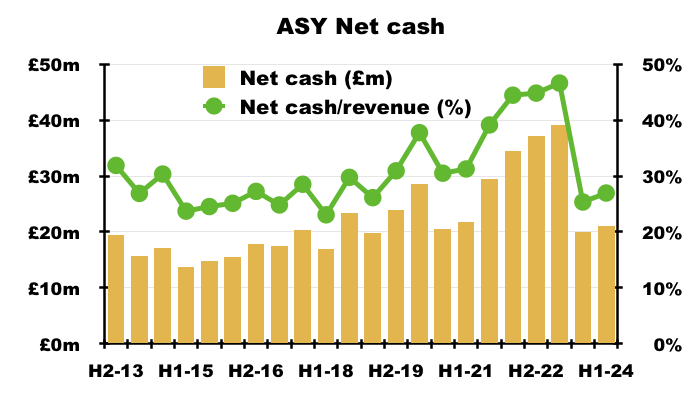
- ASY has declared three special dividends during the past few years, but net cash at £21m may not be enough to fund a further extra payout just yet.
- The special-dividend benchmark appears to be net cash of £30m or more:
- When net cash reached £30m during FY 2020, a 23.7p per share/£10m special dividend was declared;
- When H1 2022 reported net cash at £31m, a 16.6p per share/£7m special dividend was declared, and;
- When H1 2023 reported net cash at £39m, a 59.4p per share/£25m special dividend was declared.
- Net cash reaching close to £30m may not take too long.
- During this H1 and the preceding H2, free cash flow was £19m, which if repeated during the next twelve months, would take the cash position to £29m assuming ordinary dividends remain at £11m.
- An alternative to another special dividend could be occasional buybacks. The preceding FY witnessed £1.9m spent on share repurchases at an average 644p per share — 31% greater than the recent 490p.
- That £1.9m buyback has yet to prove as effective as the buybacks during FYs 2010, 2011 and 2012, when an aggregate £3.1m was spent cancelling shares at a 155p average.
- The cash position averaged £20.5m during this H1, and bank interest of £467k suggested a very useful 4.5% interest rate:
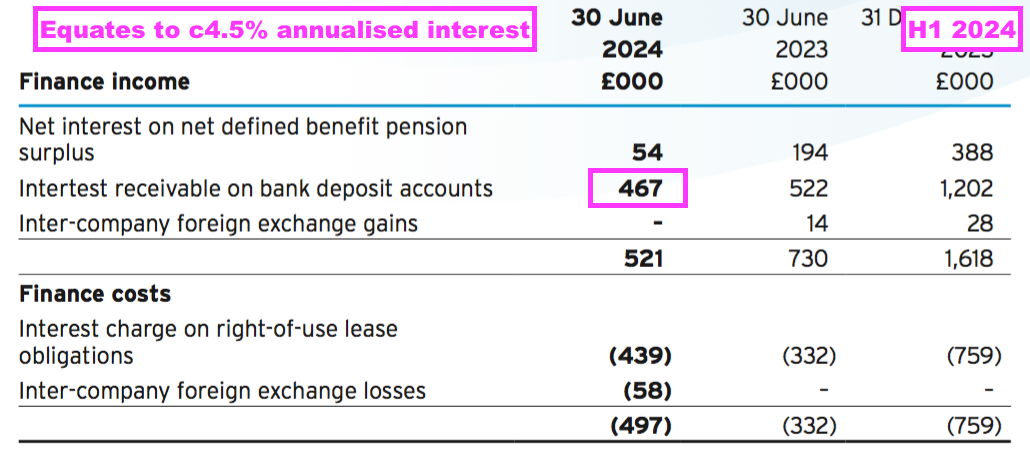
Boardroom
- ASY has been controlled by the Murray family since 1994, at which time Jacques-Gaston Murray employed his near-30% shareholding to force a boardroom reshuffle and appoint himself as non-executive chairman.
- By 2005, a mix of further share purchases and significant share buybacks had increased Mr Murray’s holding to approximately 85%.
- Mr Murray maintained his controlling interest until 2008, at which point he transferred the holding to his sons Jean-Jacques Murray and Jean-Pierre Murray:
[RNS November 2008] “The Company has been notified today that on 26 October 2008, the Chairman, Mr Jacques-Gaston Murray, transferred his controlling interest in the Tristar Corporation in equal proportion to two trusts; the Jean-Jacques Murray Trust and the Jean-Pierre Murray Trust. Accordingly these two trusts are now the ultimate controlling parties of the Tristar Corporation and subsequently the ultimate controlling parties of the Company.
“The Tristar Corporation continues to control EOI Sykes Sarl which in turn has a beneficial interest in 36,377,213 ordinary shares of one pence each in the Company (‘Ordinary Shares’) representing approximately 82.17% of the Company’s issued share capital. As a result of this transaction, the beneficial interest of Mr Jacques-Gaston Murray has decreased from 37,687,369 to 1,310,156 Ordinary Shares representing approximately 2.96% of the issued share capital of the Company.”
- Mr Murray passed away during 2023 and the board is now led by Jean-Jacques Murray, who immediately succeeded his father as chairman and then took on executive duties during early 2024:
[RNS February 2024] “The Company announces the following changes to the Board of Andrews Sykes (the “Board”) with effect from 12 February 2024:
· Jean-Jacques Murray, will become Executive Chairman. Jean-Jacques Murray has been Non-Executive Chairman since June 2023 and prior to that was Non-Executive Vice-Chairman since February 2007.
· Jean-Pierre Murray will assume the role of Non-Executive Vice-Chairman. Jean-Pierre Murray has been a Non-Executive Director since August 2008.”
- Both Jean-Jacques Murray and Jean-Pierre Murray are long-time ASY board members; the former became a non-exec during 1994 and the latter became a non-exec during 2008.
- At the last count, the Murray family boasted a 91%/£187m shareholding.
- Jean-Jacques Murray becoming executive chairman remains very intriguing.
- After all:
- ASY had coped well employing just one board executive (ASY’s managing director) since 2011, and;
- The Murray family had previously never undertaken an executive ASY role since taking the controlling interest during 1994.
- I have previously speculated Jean-Jacques Murray might now be contemplating a corporate sale.
- But if a bid does not materialise, outside shareholders ought still to be treated well. The preceding FY reiterated the benefits of the “presence and requirements of a long-standing majority shareholder”:
[FY 2023] “The presence and requirements of a long-standing majority shareholder has resulted in a strategy with the key aim of creating long–term shareholder value.”
…
“Shareholder value in the medium term to long term is intended to be delivered by driving operational excellence across the group and growing within selected markets and geographies. The Board believes that the presence and requirements of a long-standing controlling shareholder helps focus the company’s strategy on long-term shareholder value creation.”
- Those benefits include the aforementioned three special dividends:

- The special payments — and the underlying cash-generative business that funds them! — go a long way to counterbalance the Murray family’s distinctive approach to corporate governance.
- Accompanying the two Murray directors on the board are:
- ASY’s managing director;
- Three non-independent non-executives, and;
- One independent non-executive:
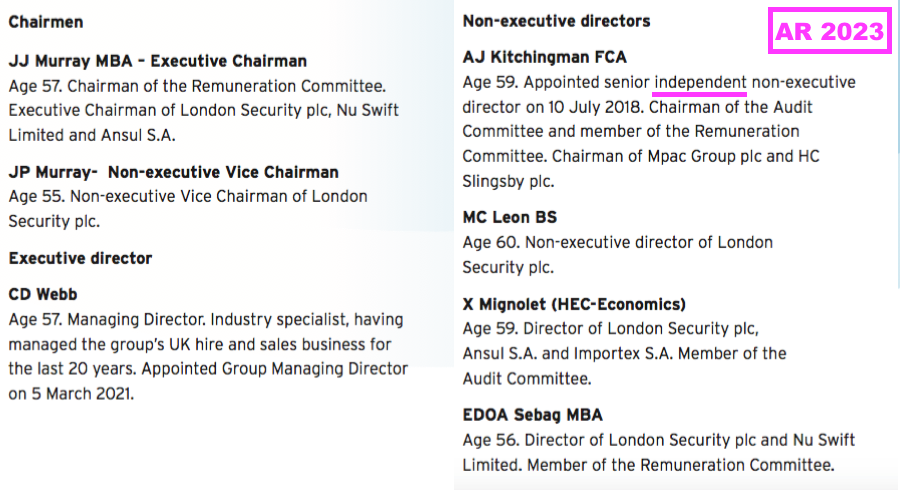
- The group MD seems a safe and loyal pair of hands. He took up his current position during 2021 after leading ASY’s main UK subsidiary for 15 years.
- The three non-independent non-executives are all long-time associates of the Murray family, and each has served as a non-exec far longer than the ‘best practice’ nine years (one non-exec was appointed during 1997 and the other two appointed during 2007).
[ASY website] “In order to reduce the administrative burden at Board meetings and to optimise the decision making process, I [Jean-Jacques Murray] often act as a conduit for the aggregated views and opinions of many of these non-independent directors.“
- The “administrative burden” of main board meetings may not be huge, given only two were held during the preceding FY (and during the FY before that) :

- The sole independent non-executive has served on the board since 2018, and was not entirely unknown to ASY prior to his appointment. He previously worked as ASY’s broker:
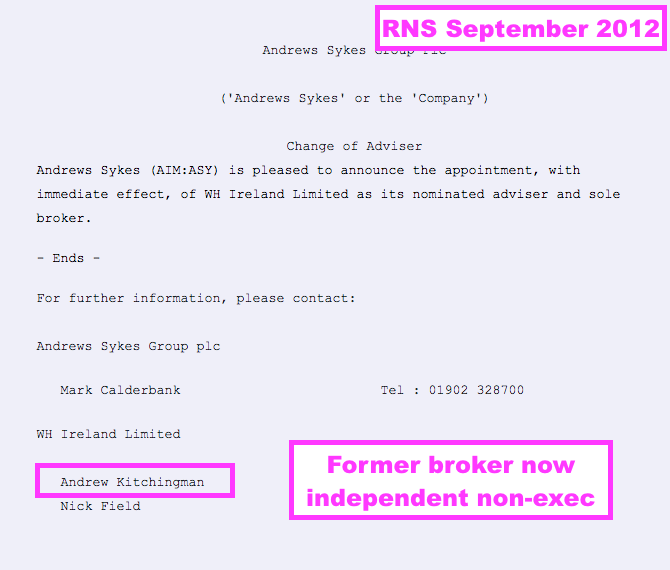
- The preceding FY stated the board was not seeking another independent non-exec:
[FY 2023] ““The company has only one independent non-executive director whereas the code recommends that boards have at least two independent non-executive directors. The Board considers that there is sufficient independence on the Board taking into account the shareholder base of the company. For this reason the Board has no current plans to appoint an additional independent non-executive director but will keep the matter under review“.“
- My notes from ASY’s 2016 AGM recounted the Murray family were ‘hands off’ shareholders who welcomed ASY’s reporting obligations as a quoted company:
[Maynard Paton June 2016] “The controlling family, who are not involved in the operation of the business, like the higher levels of management governance a stock-market listing can provide“
- Preferring to maintain ASY as a public company has possibly reduced the chance of a de-listing that a 91% shareholding can suddenly enforce on minority investors.
- Indeed, I am hopeful the Murray family keeping ASY quoted for 31 years means the de-listing risk is not as great as perhaps it once was.
- Despite the de-listing risk, I purchased ASY shares during 2013 at an average 233p and the subsequent dividends (ordinary and special) have taken my total ASY income to 382p per share. Add on my 257p per share capital gain and this investment has returned a 12% CAGR.
- I am not sure whether the board’s lack of outside shareholder engagement — no presentations or webinars are conducted — correlates to that positive CAGR.

Valuation
- This H1 suggested revenue during the subsequent H2 would struggle to match the level from the preceding H2:
“Trading in the second half of the year to date has been more subdued than in the comparable period of last year. A slow start to the summer season with cooler than average July temperatures recorded in the UK and Northern Europe has limited the overall revenue opportunities for the Group in these jurisdictions. Southern Europe and the Middle East continue to trade positively compared to the prior period.”
- But H2 profit could be shored up by further “operational efficiency“:
“The Group’s focus on continued cost control and operational efficiency will continue to limit the impact of these subdued revenue opportunities. Overall, Management remains confident of delivering full year results in line with the Board’s expectations.
- For the fifth consecutive H1, ASY’s outlook commentary referred to the general economy:
“In the longer term, Management remains optimistic that the business will continue to improve but are mindful of the impact that adverse economic issues can pose to the business and customer demand.”
- ASY’s blog sadly no longer provides much indication of customer activity, with updates now consisting mostly of general marketing articles.
- Assuming H2 2024 matches H2 2023, the forthcoming FY 2024 will report revenue of £78m and an operating profit approaching £23m.
- FY operating profit approaching £23m less 25% standard UK tax gives earnings of approximately £17m or nearly 41p per share.
- The valuation sums could be fine-tuned for:
- The £21m net cash position;
- Costs associated with the UK relocations, French closures and German start-up;
- A revival of Middle Eastern profit, and;
- Pension-scheme accounting charges, regular disposal gains and IFRS 16 lease-financing expenses.
- The 490p shares are valued at 12x my 41p per share estimate, which does not appear expensive for a high-margin, cash-rich and cash-generative business that may offer further expansion opportunities within Europe:
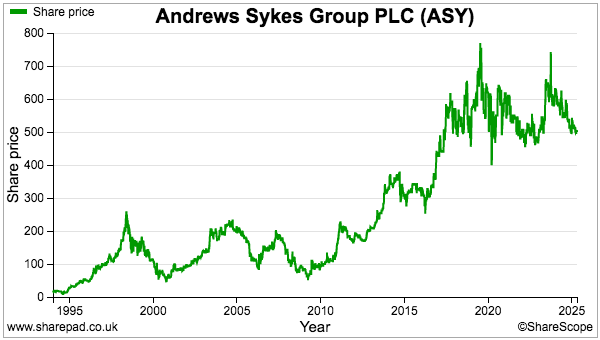
- Bear in mind ASY’s P/E has bobbed around the 15x mark during the last ten years and has rarely climbed to a premium rating:
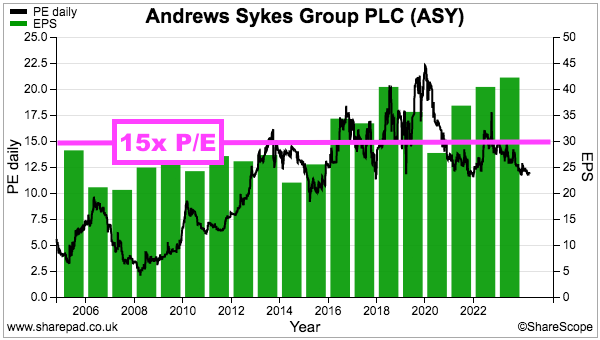
- Reasons for a modest P/E include:
- The Murray family’s 91% ownership and limited free float;
- A lack of reinvestment opportunities for growth, underlined by those three special dividends, and/or;
- The profit ups and downs due to the weather.
- Plus ASY’s economies of scale may not be fantastic. In particular, previous results have shown a persistent 1.2x limit between revenue generated from the group’s hire equipment and the original cost of that hire equipment:
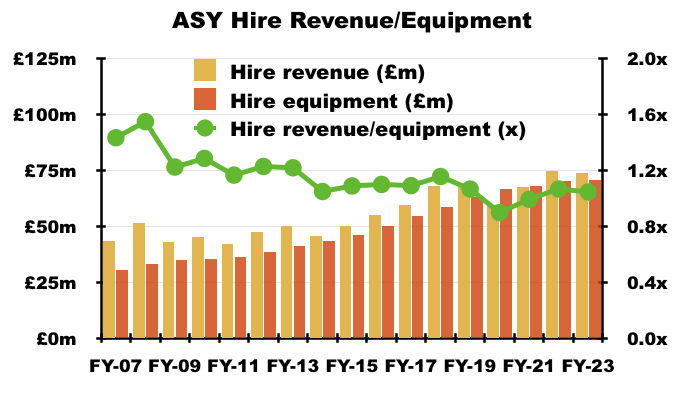
- A sustained P/E re-rating may therefore require ASY to earn more revenue from its existing hire equipment, rather than through consolidating its UK locations and/or opening more depots within Europe.
- While beneficial/extreme weather conditions are awaited, the 25.9p per share trailing twelve-month ordinary dividend supplies a handy 5.3% income at 490p.
Maynard Paton
